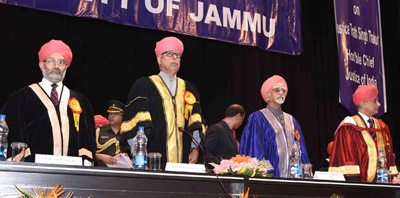
*Governor asks youth to contribute to society
Nishikant Khajuria
JAMMU, Apr 2: Underlining the centrality of the judiciary in securing the Constitutional rights of citizens, Vice-President of India, Mohd Hamid Ansari, today appealed the Supreme Court to clarify the contours within which the principles of secularism and composite culture should operate with a view to strengthen their functional modality and remove ambiguities that have crept.
“Despite its clarity, different interpretations were placed on it and there is no real consensus within the court on which secularism entails,” he said while addressing the 16th Convocation of University of Jammu, here today, wherein Chief Justice of India, Justice T S Thakur was conferred Honoris Causa by the Governor of J&K, N N Vohra, in the presence of JU Vice Chancellor, Prof R D Sharma and others.
The Vice-President said that any discussion of the Constitutional ideal of India being a ‘secular’ republic having a ‘composite culture’ has to be premised on the existential reality of the society which is characterized by heterogeneity. “The three generally accepted characteristics of a secular State; namely liberty to practice religion, equality between religions and neutrality have been invoked but their application has been contradictory and has led to major anomalies,” he added.
“Observers have noted that subsequent pronouncements of the Supreme Court have effectively vindicated the profoundly anti-secular vision of secularism of some quarters. For this reason, it has been argued whether a more complete separation of religion and politics might not better serve Indian democracy,” Ansari said and added that the challenge is to develop a formula for equidistance and minimum involvement since wall of separation was not possible under Indian conditions.
“For this purpose, principles of faith need to be segregated from contours of culture since a conflation of the two obfuscates the boundaries of both and creates space to equivocalness. Furthermore, such an argument could be availed of by other faiths in the land since all claim a cultural sphere and a historical justification for it,” he explained.
Quoting eminent jurists, the Vice President said, that unless the Court strives in every possible way to assure that the Constitution, the law, applies fairly to all citizens, the Court cannot be said to have fulfilled its custodial responsibility. “Is it therefore bold to expect that the Supreme Court may consider, in its wisdom, to clarify the contours within which the principles of secularism and composite culture should operate with a view to strengthen their functional modality and remove ambiguities that have crept in?”, Ansari said.
The Vice-President opined that whether India develop as a melting pot of culture or only remained a salad bowl is no more the issue but the crucial question is whether Indian culture is conceived as a static phenomenon, tracing its identity to a single unchanging source, or a dynamic phenomenon, critically and creatively interrogating all that is new.
Earlier, delivering his acceptance speech on being conferred the degree of Doctor of Law ( Honoris Causa), CJI, Justice T S Thakur, became visibly emotional and said it was glory of the system we have that people of J&K have distinguished themselves at State as well as national levels notwithstanding limited resources.
“J&K is very small in comparison to other big States like Uttar Pradesh, Maharashtra, etc, which are relatively bigger in size as well as in respect of resources they have. But when it comes to human intellect, resources and size have not affected us. We have done well and people of this State have distinguished themselves at national level,” said the son of the soil amidst a big applause by the audience, which comprised top bureaucrats, politicians, intellectuals, academicians and cream of the society.
Conveying his thanks to Jammu University for conferring Honoris Causa upon him, the CJI felt all proud and emotional to have received the honour from his Alma Mater. He dedicated this Honour to his parents and teachers whom he thanked to have in shaping his career as a student.
“As a student, I will only say that I am a product of Government school and Government college where I had not to pay any tuition fee except 50 Paisa as annual sports charges. But the teachers were good, they could create, shape and prepare people for struggle of life,” he said.
In his address, Governor N N Vohra, who is also Chancellor of the Jammu University, expressed his satisfaction over the institutional progress during the past one year.
Congratulating the awardees and the medal recipients, the Chancellor encouraged the youth to contribute in best possible ways towards spreading literacy, environmental sustainability and sanitation concerns. He also stressed the youth to work for economically and socially depressed sections of the society. “Wherever we go in our professional career, it is our moral responsibility to pay back to the society as well as institutions and even a single contributes a lot,” he added.
The Governor also expressed the pride in honouring Justice T S Thakur as the alumni of Jammu University and termed this conferring of Honoris Causa on the latter as the honour coming to JU itself.

